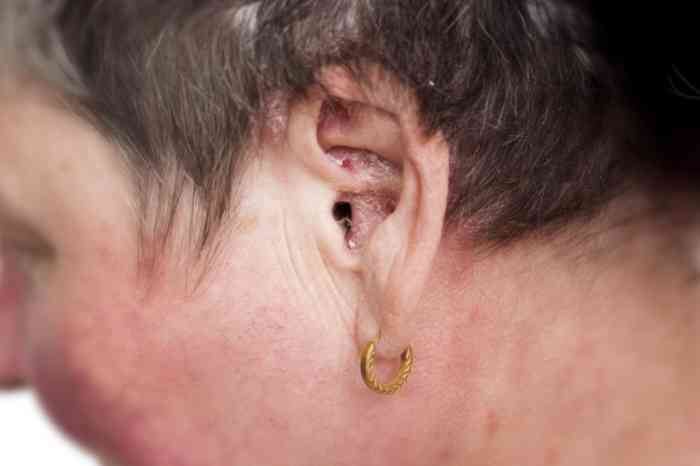
You may have heard of psoriasis, a condition that causes irritated skin. But did you know it can occur in your ears as well? Learn more about how this condition affects your ears and discover treatment options to find relief.
Psoriasis is a common, chronic skin condition that affects children and adults, categorized by patches of scaly skin that are painful and itchy. Psoriasis in the ears causes a buildup of scaly skin or earwax. The condition is identified by skin redness and round, raised patches of skin covered in white, flaky dead skin (also known as plaques).
While the exact cause of this autoimmune condition is still unknown, it is characterized by overactivity in the immune system. In psoriasis patients, the immune system attacks its own cells and issues, targeting skin cells, known as keratinocytes. Those skin cells grow and divide faster than they can be shed, causing red, inflamed patches to appear. Psoriasis can be transmitted genetically, meaning that a child whose parents have psoriasis is at a higher risk for developing it as well. Other triggers include high mental stress response, alcohol use and smoking, and certain medications.
Psoriasis in ears symptoms are visually identifiable:
- extensive redness;
- white flaky patches on the skin;
- peeling skin.
These can also be accompanied by intense itchiness in or around the ears. If the psoriasis becomes infected, there might be crusting and oozing around the plaques.
In most cases, psoriasis in the ears can be diagnosed with a physical exam to identify and characterize the plaques. Your doctor will also review your medical history to assess your risk for the disease. If these methods don’t offer conclusive results, your doctor might order a skin biopsy to examine the skin cells. If you’re also experiencing vertigo, your doctor might order an MRI to see if there are internal issues.
Depending on your symptoms, there are many ear psoriasis treatment options available. Some medications include:
- Topical creams/ointments: Over-the-counter (OTC) hydrocortisone and ointments can be applied to soothe external itching.
- Oral antibiotics: These medications can be used if a bacterial infection develops.
- Light therapy: UVB can be a useful tool in penetrating the skin and slowing the growth of affected skin cells.
- Shampoos: Antifungal dandruff shampoos can help prevent secondary fungal infections.
- Systemic medications: If you experience moderate to severe psoriasis, you might be prescribed a systemic drug to treat symptoms all over your body.
Talk to your doctor to explore your options and determine which solutions will work best for you.
If you wear hearing aids and have ear psoriasis, you may experience some discomfort while wearing your devices. Depending on the type of hearing aid you wear and where your psoriasis is located, there might be some additional friction or irritation from your devices. If you have discomfort as a result of wearing your hearing aids with ear psoriasis, speak with a hearing care professional at your local Miracle-Ear to find a comfortable solution.
The above is the interpretation of Managing Ear Psoriasis: Symptoms, Triggers, and Treatments provided by Chinese hearing aid supplier Shenrui Medical. Link https://www.srmcm.com/Blog/Managing_Ear_Psoriasis_Symptoms_Triggers_and_Treatments.html of this article is welcome to share and forward. For more hearing aid related information, please visit Blog or take a look at our Hearing aids products















